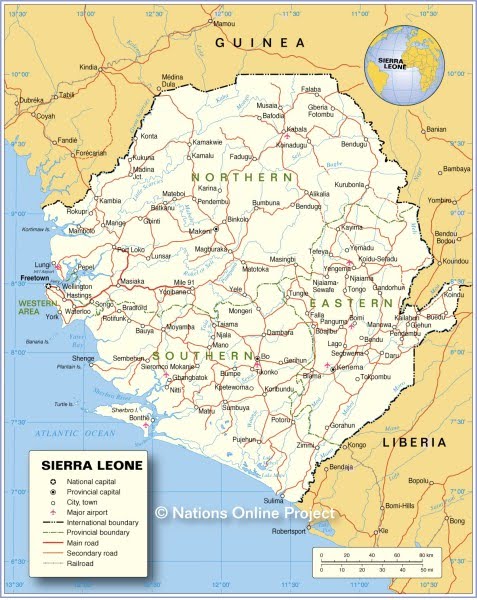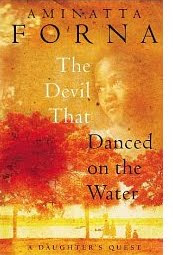
Girls Education Week in Sierra Leone takes place in October each year. Opportunities are provided for girls to express their concerns about education, and to challenge the government to make sure that improvements take place.
Sierra Leone's education system is divided into four stages; primary education lasting six years, junior secondary education of three years, three years of either senior secondary education or technical vocational education and four years of university or other tertiary education. Since 2004 all primary education and junior secondary school for girls in the northern and eastern areas. Fees were also abolished for the National Primary School Examination (NPSE) that is taken at the end

of primary school which led to an increase in enrolments for the exam . The NPSE is designed by the West African Examination Council and has to be passed in order to progress to secondary education. A the end of secondary education students sit WASCE, the West African School Certificate of Education.
In Sierra Leone, an estimated 64 percent of primary school aged children are currently enrolled in school. However, only 54 percent of enrolled girls successfully complete their primary education. Although attendance rates for boys and girls are almost equal at the primary education level, attendance rates for girls in secondary school stands at only 29 percent. There are many reasons for the poor attendance by girls: they may miss school one week per month as a result of not having access to sanitary protection during menstruation, lack of financial resources, early marriage or pregnancy, heavy household responsibilities for girls, lack of appropriate educational resources, primacy placed on boys' education, mothers' heavy workload.
“We need to give a voice to the other girls who can’t be here. Pregnancy and poverty and are some of the biggest problems affecting girls’ education. And when people are aware of the problem, they can start to make changes for the

better,” said Salamatu Bangura, 15, from the Methodist High School, which is just over the wall from where we live, during her presentation at the Girls Education Week.
As part of Girls Education Week, Fatmata, from Bo and over 75 girls from around Sierra Leone presented a petition to the Speaker of Parliament and a cross-section of parliamentarians which called for stricter legislation to support girls’ education.
“2015 is around the corner. Every country will have a report card. If you work hard, you will get good grades. If you don’t work hard, then you will fail. We need to start working hard now,” remarked Fatmata to the Speaker of the House of Parliament.
We were sitting on our veranda having our evening meal, after dark, when the gatekeeper came to inform Peter that Isabel wanted to see him. Not knowing any Isabel he was intrigued, and later returned with Isabel’s story. She was to speak at the Independence Celebrations at the National Stadium with the task of thanking the President for what he had done to help children

in school. She needed money to get her hair done, so assistance was given. Isabel then came, again in the evening, on the day of the Independence celebration to tell us how it went, but to say she had not had enough money to get her hair done. A few days later she returned again, this time with her hair plaited, so we could see it, and as Peter escorted her to the gate, she asked for money for her school fees. We later discovered that they were not for her actual fees but for the cost of private lessons, offered by a teacher, with the promise that she would be able to sit her WASCE exams privately, and earlier.
Isabel had been sent to Freetown, following the death of her mother, by her father, so that she could continue her education. She was to live with an aunt who would support her.
The nightly visits from Isabel continued and included a story already told in an earlier blog of being evicted from the house she was living in with her aunt.
More recently she appeared and was sick, with stomach problems. Assistance was given to get it sorted out, and within days she was back, in tears saying she had been told she was two months pregnant. Always visiting at night, and often when did not have power or the generator on, it was difficult to note her physique. So she was taken to the clinic, and with just a glance the nurse indicated she was 26 weeks pregnant. This was later confirmed, but with the ante natal tests she was discovered to be HIV+, and to have a number of STIs.
Treatment for HIV is free in Sierra Leone, and Isabel needed to get started on the treatment for herself and the baby immediately, as well as iron to combat anaemia, and treatment for the STIs. Isabel’s father was informed of her pregnancy and he came to collect her, to take her back to the

village to have her baby. She returned with a letter of referral from the clinic in Freetown for the local hospital in Port Loko. Hopefully all her treatment will continue, but will she continue her education?
Casual sexual encounters, for money, but not as “a street girl”, are not unknown amongst teenage girls. When the odds are against you to get your school fees, and all the additional expenses where are you to get the money? Education does not just involve fees irrespective of what level you are in. Teachers may demand the students bring in food, or fresh vegetables, suggest that private lessons will ensure good results, envelopes are presented to teachers at the time of examinations, or girls may be asked to meet privately with male teachers. There is also the cost of the school uniform for daily wear, and a special uniform for events such as the school thanksgiving. Some teachers will expect students to buy photocopies of materials and if you

don’t have them, then the chance of passing tests and exams is limited. You have to pay for all the exams that you take. The hidden costs of education are multiple. Teachers’ salaries are low, and so they will find creative ways of supplementing their income, often to the detriment of the students.
But many parents are committed to educating their daughters, as is Isabel’s father. Another example is Salena McCaphy who lives in the town of Waterloo to the East of Freedom. She is the mother of six children- five girls and one boy. She lost her husband earlier this year, leaving her to raise her children alone. Surviving on a very modest salary from selling vegetables from her garden, Salena faces financial uncertainty which could force her to put her children to work. In spite of all this, Salena sends all five of her girls to school – something rare here in rural Sierra

Leone.
“Investing in our girls’ education will have big rewards for us,” Salena says. “I want my children to be educated so that they won’t have the problems that I have – like financial troubles. I want them to grow up to be happy.”
The oldest of these children, Humu Aruna is 13 years old. She recently passed the National Primary School Exam (NPSE), a required exam for students throughout Sierra Leone. “I want to be a nurse when I grow up, so that I can take care of my mother and grandmother. I’m so proud that I passed the exam, and I made my mother proud too!”
For more pictures on the challenge of girl education in Sierra Leone see: http://www.unicef.org/wcaro/2799.html
 two years, and so we have extended it by just a few weeks to complete all the semester work at the Theological College, including attending graduation, marking of exams, and handing over of marks for the semester.
two years, and so we have extended it by just a few weeks to complete all the semester work at the Theological College, including attending graduation, marking of exams, and handing over of marks for the semester. 


















































